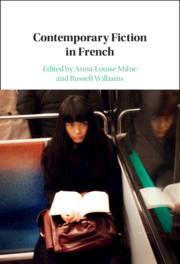Book contents
- Contemporary Fiction in French
- Contemporary Fiction in French
- Copyright page
- Contents
- Figures
- Notes on Contributors
- Introduction
- Chapter 1 Mediterranean Francophone Writing
- Chapter 2 After the Experiment
- Chapter 3 Getting a Future
- Chapter 4 Contemporary French Fiction and the World
- Chapter 5 The Franco-American Novel
- Chapter 6 Graphic Novel Revolution(s)
- Chapter 7 ‘Back in the USSR’
- Chapter 8 Fictions of Self
- Chapter 9 Trauma, Transmission, Repression
- Chapter 10 Wretched of the Sea
- Chapter 11 Urban Dystopias
- Chapter 12 Imagining Civil War in the Contemporary French Novel
- Notes
- Select Secondary Bibliography
- Index
Chapter 9 - Trauma, Transmission, Repression
Published online by Cambridge University Press: 30 March 2021
- Contemporary Fiction in French
- Contemporary Fiction in French
- Copyright page
- Contents
- Figures
- Notes on Contributors
- Introduction
- Chapter 1 Mediterranean Francophone Writing
- Chapter 2 After the Experiment
- Chapter 3 Getting a Future
- Chapter 4 Contemporary French Fiction and the World
- Chapter 5 The Franco-American Novel
- Chapter 6 Graphic Novel Revolution(s)
- Chapter 7 ‘Back in the USSR’
- Chapter 8 Fictions of Self
- Chapter 9 Trauma, Transmission, Repression
- Chapter 10 Wretched of the Sea
- Chapter 11 Urban Dystopias
- Chapter 12 Imagining Civil War in the Contemporary French Novel
- Notes
- Select Secondary Bibliography
- Index
Summary
In recent decades, contemporary fiction in French has been reinvigorated by works that deal with questions of violence, trauma and memory. These works – many of which relate to the Holocaust, but also to other sites of extreme violence, such as the Algerian War of Independence, slavery and the Rwandan genocide – have often been influenced by the broader theoretical debates about art, catastrophe, trauma and the telling of history. How can fiction respond to traumatic events, what is the relationship between history and memory, who gets to define the past, and how does a fiction of trauma deal with questions of complicity, guilt and justice? Recent literary responses to these questions show fiction’s complex engagement with histories of violence, and demonstrate the ongoing relevance of literature to our encounter with pasts that have not passed. This chapter will approach this complexity and range through a consideration of seven works by Charlotte Delbo, Georges Perec, Patrick Modiano, Didier Daeninckx, Thierry Jonquet, Nancy Huston and Boualem Sansal. It is organized in four sections, each one addressing a range of the above issues: testimony, fiction and writing; spectral memory and the city; crime fiction; and interconnected memories.
- Type
- Chapter
- Information
- Contemporary Fiction in French , pp. 167 - 183Publisher: Cambridge University PressPrint publication year: 2021
- 1
- Cited by



